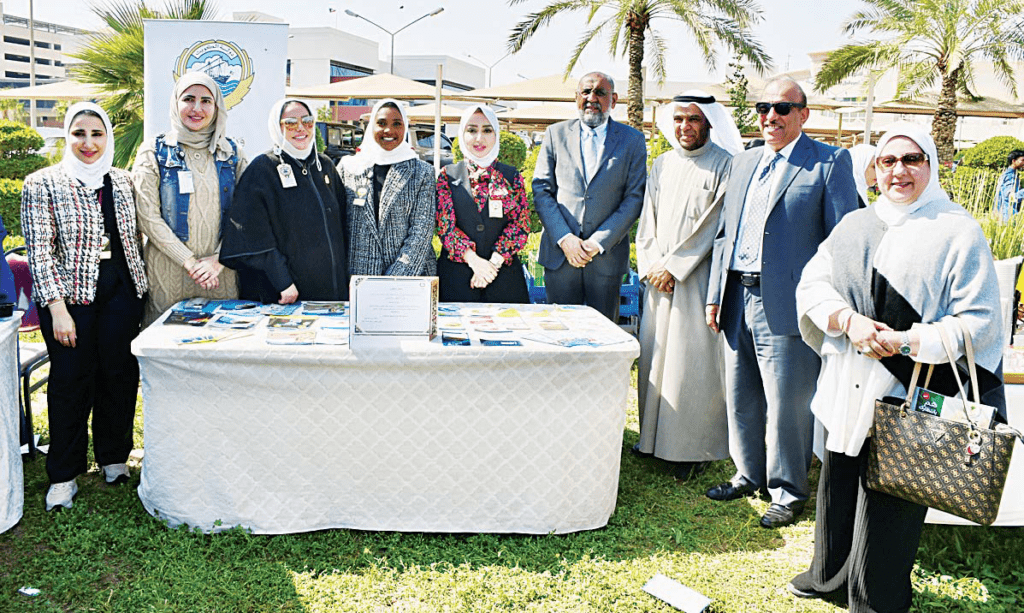03/03/2024
03/03/2024
KUWAIT CITY, March 3: The Cancer Aware Nation (CAN) launched the “Your Health First” campaign to raise awareness about colon cancer. According to the Chairman of the CAN’s Board of Directors Dr. Khaled Al-Saleh, colon cancer ranks first among men in the State of Kuwait. Awareness about the risk factors related to colon cancer represents a road map to achieving good health and being free of chronic diseases, especially cancer.

Dr. Khaled Al-Saleh stressed the need to adopt a lifestyle that includes a balanced diet rich in fruits and vegetables, and physical activity, especially with the approaching month of Ramadan. He highlighted the need to avoid it in all its forms and types, as it reduces the body’s immunity and makes it susceptible to diseases, including tumors. Dr. Al-Saleh explained that awareness is the cornerstone of prevention and early detection of cancerous diseases.
CAN has worked for more than a decade to change the misconception about cancer in society as a fatal disease from 83 percent before the start of its activities to 52 percent. It also raised the rate of people who believe in the importance of early detection from 50 percent to 70 percent after its launch. This is an indicator of the success of the awareness campaigns it carries out for many cancerous diseases throughout the year, including the “Your Health First” campaign in March, which is Colorectal Cancer Awareness Month.
Progress has been witnessed in the past two decades in the ranking of types of cancer in terms of prevalence in Kuwait and the Gulf countries. There is a consensus among specialists on the need to intensify awareness about colon and rectal tumors, as well as pay attention to the investigation and early detection programs to detect signs of tumor infection at an early stage, avoid complications of treatment in the late stages, and train doctors on the latest developments in screening and early detection methods in this field, for speedy diagnosis and referral to specialists. Dr. Khaled Al-Saleh confirmed that there is a great development in medications and treatments for colon tumors.
Meanwhile, Director of the Department of Prevention and Response to Chronic Non-Communicable Diseases at the Ministry of Health Dr. Hamoud Al-Zuabi explained that chronic noncommunicable diseases are at the forefront of health challenges in all countries of the world due to their numerous health, economic and social burdens on the individual, family and society. It causes more than two-thirds of the deaths in the world, including cancer, which ranks second after cardiovascular diseases. This requires working through a comprehensive national strategic plan and effective community partnerships to combat these diseases. He stated that colon cancer is not just statistics and numbers, but rather a reality that can be changed through awareness and early detection. Dr. Al-Zuabi affirmed that it is part of the national strategy for preventing and responding to chronic noncommunicable diseases, which aims to reduce the premature death rate resulting from chronic non-communicable diseases by 30 percent by 2030, in line with the third goal of the United Nations Sustainable Development Goals.
He indicated that the Ministry of Health is working on implementing the national program for colorectal cancer detection and cancer screening in primary healthcare centers. Dr. Al-Zuabi said, “To reduce the effects that these diseases may have on individuals and society, a comprehensive approach must be developed that requires the participation of all sectors (governmental and non-governmental) to work together to reduce the risks associated with these diseases and enhance interventions aimed at preventing and controlling them. Community partnership is considered the backbone of any successful efforts in the field of health, as it unites the efforts of institutions, enhances the spirit of cooperation, enhances collective contribution to community health care, and turns awareness into actual action.”


